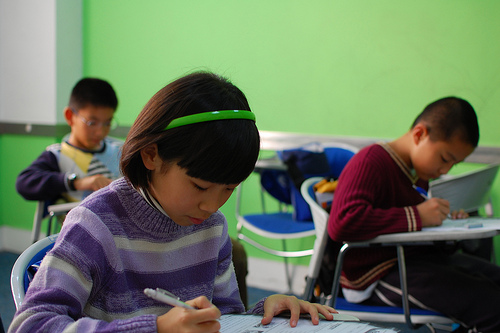 For families in China, finding a place for their child at a good school in a good neighborhood is essential. But competition is fierce, and admissions requirements are often prohibitive. While wealthy families are able to use money and influence to bend admissions rules, poor families are at a disadvantage.
For families in China, finding a place for their child at a good school in a good neighborhood is essential. But competition is fierce, and admissions requirements are often prohibitive. While wealthy families are able to use money and influence to bend admissions rules, poor families are at a disadvantage.
Huangchenggen Elementary School is one of the best in Beijing. It feeds into a top secondary school, from which graduates attend some of China’s best colleges. To be eligible for admission, families must reside within Huangchenggen’s district. For families who do not, there is a solution, if they can afford it: buy a second house.
Wealthy parents have been known to buy property in the enrollment district of a good school as an “admission ticket.” Often they do not even live there. The phenonmenon is so widespread it has driven housing prices in the Huangchenggen district to over $1,200 per square foot.
If a second home is out of reach, well-connected parents, such as those who work in government, are often still able to pull strings and secure a place for their children.
In this atmosphere poorer families have almost no chance of getting their children into a good school. For them the financial barriers and corruption are not only frustrating, they are detrimental to their children’s future.
Shang Xuejing, a mother from a rural district, has moved to Beijing and now lives near Huangchenggen Elementary. As a poor migrant, she is not eligible for hukou- urban household registration- a requirement for admission into Huangchenggen. There is nothing she can do to bend the rules.
“Why can’t the same children have the same opportunities? We all want the best for our kids,” she asks.
Instead her son must attend a poor-quality school farther from home. Attending a school like this lowers a student’s chances of getting into a good high school, and a good college. Such schools are also at risk of sudden closure.
Though the prevailing culture in China dictates that attending a good school ensures that graduates will eventually get a good job, Chinese young people from all backgrounds are facing a tough job market. As more graduates compete for the same number of jobs, the pressure to stand out becomes even greater. Parents become more desperate to give their children an advantage, and try to find a spot in a good school, whatever it takes.
Creative Commons Love: Renato Genoza on Flickr.com

















